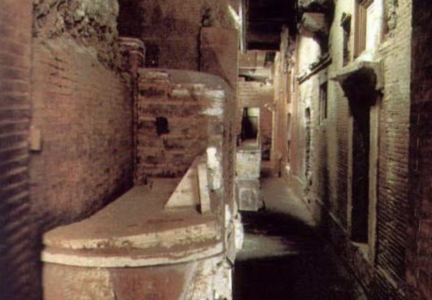Paul Babic is a first year MDiv student at the Regis St. Michael’s Faculty of Theology with a background in Philosophy and Religious Studies from McMaster University. He, too, took part in the inaugural Catholic Perspectives on Ecumenical and Interreligious Movements course in Rome this past summer. With his MDiv, he hopes to help and serve those “who may feel as though God has abandoned them.” In his spare time, he enjoys blogging, lots of coffee, conversations with friends, and long walks.
I’ve tried many times to write about why I loved Rome. I think I’ve failed to do so because, truth be told, if I were to list everything that I loved about it—all the priceless works of art, the winding streets, the beautiful churches—then I wouldn’t be able to stop. My writing would be aimlessly adrift, with no point, and simply in awe of what I felt while I was there.
It’s certainly true that Rome lives up to her reputation: she is the Eternal City. She contains countless treasures to be adored, be it the Sistine Chapel or a Pope-approved gelato on Via Gregorio VII. Not to mention that, for the first time, I found myself at the heart of the Catholic Church and its faith, which is, of course, the faith that led us all there. To have not only studied large swaths of Christian history at the Centro Pro Unione but to have visited so many of the basilicas and sites of pilgrimage gave me a very intimate experience of just how ancient and incarnate Christ’s Church really is.

To give you just one example, I was deeply touched by our visit to St Peter’s tomb. This was not the only tomb of the Apostle that we would see, but it was the only one whose history was explained to us in great detail and, as we fought the humidity beneath that fabled basilica, we listened to how Christians kept track of Peter’s tomb for centuries. We heard how it was distinguished from the other graves, how Constantine encased it in marble, how it was eventually buried, and for long after seemed like nothing but an urban myth. Then, in the 20th century, it was discovered and excavated, and now it is possible to see as part of that lost necropolis today. As I saw it for my own eyes, I can remember thinking of how many pilgrims have done the same; I thought of how this was, in many ways, representative of the Church’s apostolic memory; and, of course, I thought of whose bones lay right in front of me, and who he gave them up for.
But amidst these enchanting experiences, aside from awe, I felt something else: I felt grateful, and I felt that way because, one year ago, I would have never imagined the opportunity for such an adventure. Rome was the kind of thing I would only see in films, and it felt very far away. Surely, for any Catholic who studies theology, studying in Rome—for any period—is like a dream come true, and when I saw the opportunity to do just that, I jumped at it. Had it not been for that, I might never have seen those sights in Rome for a few more years at least, if not many more than that, but even then, I’d certainly wouldn’t have had those experiences because I did not go alone. With me, there was a terrific cohort from Regis St Mike’s, and what fond memories we made together!
However, I’m not simply grateful to have had great travel companions. Leaving aside the spectacle for a moment, I also wanted to thank the University of St Michael’s College and the Centro Pro Unione for making it all possible. Additionally, I’d like to thank our President, David Sylvester, and his wife for coming to visit us; our Archbishop, Francis Leo, for the hospitality and kind words he shared with us at the Canadian Pontifical College; the kind funding for the program from donors and, of course, our professor, Mike Attridge, without whom none of this would have been possible.
All of that to say, I fell in love with Rome during my three weeks there, and for anyone doubting whether or not to give experiential learning a go, I’d urge them to put their doubts aside because I promise that you won’t regret it.
Read other InsightOut posts
